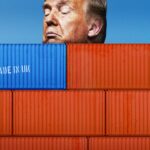Explore Martine Wolf’s analysis of the economics costs of Trump’s global deals, including tariffs, geopolitical shifts, and market trends. Learn how these policies impact trade, alliances, and long-term growth.
Introduction: Trump’s Global Deals Reshape Trade and Geopolitics
The economics costs of Trump’s global deals are reverberating across international markets and alliances. From aggressive tariffs on key trading partners to the suspension of military aid for Ukraine, these decisions—analyzed by Financial Times columnist Martine Wolf—threaten to dismantle decades of rules-based globalization. This article explores the fallout of Trump’s policies, their implications for global deals, and how market trends are adapting to this new era of uncertainty.
The Economics Costs of Trump’s Tariffs: A Flawed Strategy
On March 3, 2025, Donald Trump imposed sweeping tariffs: 25% on Canada and Mexico, 10% on Chinese imports (on top of existing 10% tariffs), and a pending 25% levy on EU goods. These four economies account for 61% of U.S. goods imports, making this a high-stakes gamble.
Martine Wolf highlights the irony: Trump’s tariffs ignore the root cause of U.S. trade deficits—massive federal fiscal deficits (6% of GDP)—as noted by former IMF economist Maurice Obstfeld. “Attempting to fix trade deficits with tariffs is like flattening a balloon,” Wolf argues. The Republican Senate’s plan to extend Trump’s 2017 tax cuts ensures deficits persist, undermining tariff efficacy.
Key Financial Metrics: Tariff Impact
| Metric | Canada | Mexico | EU |
|---|---|---|---|
| Exports to U.S./GDP | 21% | 27% | 2.9% |
| Tariff Rate | 25% | 25% | 25% |
Pros: Short-term political leverage.
Cons: Retaliatory measures, supply chain disruptions, and long-term trust erosion.
Global Deals in Peril: The EU and U.S. Trade Relationship
Trump’s claim that the EU was formed to “screw the United States” is dismantled by Martine Wolf. The EU’s inception aimed to foster post-war economic stability—a vision once championed by the U.S. Today, Trump’s fixation on bilateral goods deficits ignores services trade and capital returns. Danish economist Jesper Rangvid notes the U.S.-Eurozone current account balance is near zero when services and investments are included.
Internal Link: How Global Deals Shape Post-War Economies
External Link: Jesper Rangvid’s Blog on Trade Balances
The Geopolitical Gamble: Abandoning Ukraine
More alarming than trade wars is Trump’s suspension of military aid to Ukraine, forcing Kyiv into a Hobson’s choice between surrender and defeat. This move, cheered by Putin, risks fracturing NATO and empowering Russia. Martine Wolf warns Europe must now shoulder defense burdens, with Germany’s Friedrich Merz prioritizing “independence from the USA.”
Europe’s Path Forward
- Transfer €200bn in frozen Russian reserves to Ukraine.
- Accelerate defense spending to counterbalance Russia (EU+UK GDP is 4.7x Russia’s PPP).
External Link: FT Analysis on EU Defense
Market Trends: Adapting to New Global Deals
Recent developments highlight how markets are navigating Trump’s policies:
1. EU Retaliatory Tariffs (Source: Reuters)
The EU announced tariffs on $45bn of U.S. goods, targeting agriculture and tech. Analysts predict a 0.5% dip in Eurozone GDP.
2. U.S.-China Tech Cold War (Source: Bloomberg)
China’s semiconductor exports rose 18% in Q2 2025, reducing reliance on U.S. tech amid prolonged tariffs.
3. NATO Defense Stocks Surge (Source: CNBC)
European defense contractors like Rheinmetall (+32% YTD) and BAE Systems (+24%) rally as EU militarizes.
4. Commodity Volatility (Source: WSJ)
Aluminum prices hit a 12-year high due to supply chain bottlenecks from U.S.-Mexico trade disputes.
Risks and Uncertainties in Trump’s Global Deals
- Economic Costs: Retaliation could spiral into a 2008-style crisis.
- Political Risks: Eroding NATO unity empowers autocratic regimes.
- Market Volatility: Investors flock to gold and cryptocurrencies as safe havens.
Internal Link: How Tariffs Affect Your Portfolio
Conclusion: A Fractured Global Order
Martine Wolf concludes that Trump’s policies—rooted in economic illiteracy and geopolitical shortsightedness—will leave the U.S. isolated. The economics costs of Trump’s global deals are not just a burden for allies but a “existential reckoning” for America’s role as a global leader. As Europe pivots toward self-reliance and markets brace for turbulence, the world faces a stark choice: adapt or succumb to fragmentation.
External Link: Read Martine Wolf’s Latest FT Column
For more on market trends and geopolitical analysis, subscribe to our newsletter. All rights reserved.









